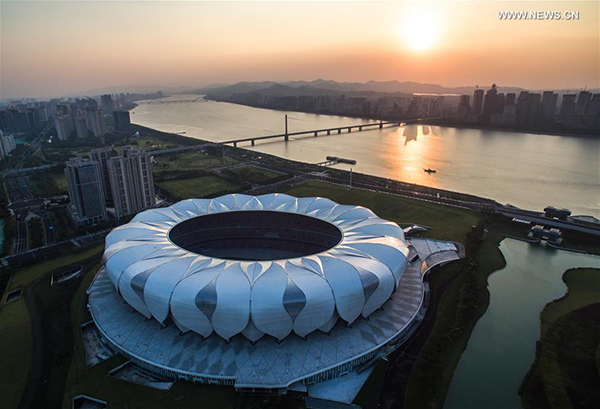|
 |
|
Photo taken on Aug 25, 2016 shows the Hangzhou Olympic Sports Center in the Binjiang district of Hangzhou, capital of East China's Zhejiang province. Hangzhou is the host city for the upcoming G20 Summit.[Photo/Xinhua] |
The annual G20 summit of the world’s biggest nations (plus representatives of the European Union), to be held in Hangzhou on September 4th and 5th, faces a set of imposing challenges. There are three types of challenges: economic, geopolitical and environmental. None of the problems in these three areas are easy to solve.
Economically, the world appears to be in a phase of slowing growth. The global economy remains bogged down in the aftermath of the 2008 debt crisis. Increasingly, many people are starting to suspect that that year marked the end of the boom years of the liberal free market economic model, and that a new type of global economic system is needed. However, there is no consensus about what that new system should be or what adjustments should be made in order to construct it.
Environmentally, nature is under severe strain, as Chinese people, observing their polluted skies and rivers, know only too well. Mankind, desiring comfort and plenty, has stripped what it wants from the Earth for too long. The case for urgent action on global warming and climate change is clear.
Ideally, action on environmental issues would involve major reductions in all areas of human exploitation of the planet, or what some are calling ‘degrowth’. This would involve cutting back heavily on production and consumption of goods in order to rapidly bring down fossil fuels emissions. Unfortunately, such a plan is unworkable at present because it would entail sending the global economy into a terminal death spiral. So for the time being something more modestis the best that can be hoped for.
In other words, the world leaders meeting in Hangzhou have their work cut out for them. Each country has its own priorities, its own agendas. There is no easy way to bring all the different national viewpoints together to produce a cohesive, coherent vision of how the 21st century ought to pan out for the maximum benefit of both the human race and the planet as a whole.
What is needed is calm dialogue within a clear framework. Yet even establishing such a framework is difficult given the self-evident lack of trust between the negotiating parties. It also demands some clear-sighted leadership, which is, to be brutally honest, not in abundance among today’s global political elites.
There is, however, still some cause for cautious optimism. The fact that this G20 is taking place in Hangzhou presents an opportunity for progress. In the last few years China has begun to find its feet in the international community and to demonstrate some evidence of leadership qualities. Since Robert Zoellick, then the US Deputy Secretary of State, called in 2005 for China to be a ‘responsible stakeholder’, the Beijing government has taken some steps to answer this call.
After Xi Jinping became president in 2013,China launched initiatives such as the Belt and Road initiative, the Silk Road Fund and the Asian Infrastructure Investment Bank. These are in their early stages of realization, but represent a constructive attempt to connect nations in Asia, East Africa and Europe via transport networks, appropriate financing, and much-needed new infrastructure.
China has also demonstrated willingness to cooperate with the US on achieving the COP21 climate goals set in Paris in 2015.
The Chinese government has also stated its intention to institute ‘supply-side’ reforms. These are intended to shift the emphasis of the economy away from excessive industrial production towards something more sustainable.
These are positive signs of China’s emerging attempts at constructive global leadership.
Out of all the G20 partners, China’s plans for carefully-structured, gradual systemic change are by far the most coherent. China also demonstrates the political will, concentrated in the determined figure of Xi Jinping, to get the job done. So there is hope that China’s president will be able, despite probable reluctance on the part of some of the other heads of state, to build the relationships of trust necessary to persuade world leaders to take steps towards the type of geo-economic reforms that are desperately needed in today’s world.
Jeremy Garlick is lecturer in international relations at the Jan Masaryk Centre for International Studies, University of Economics in Prague.
The opinions expressed here are those of the writer and don't represent views of China Daily website.